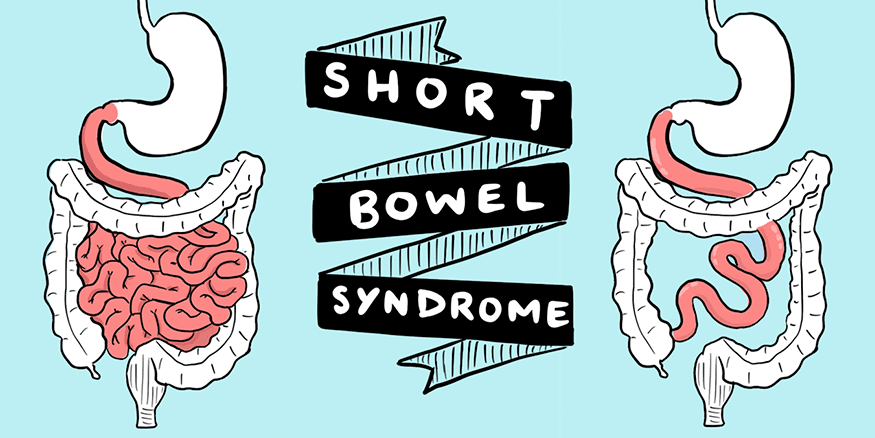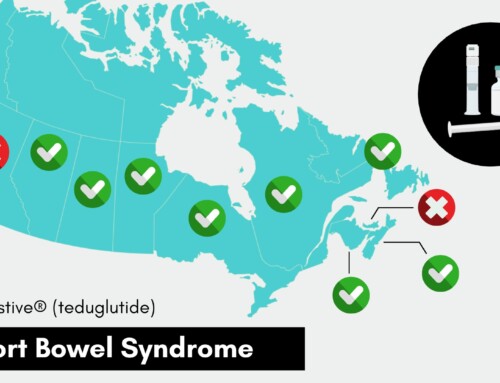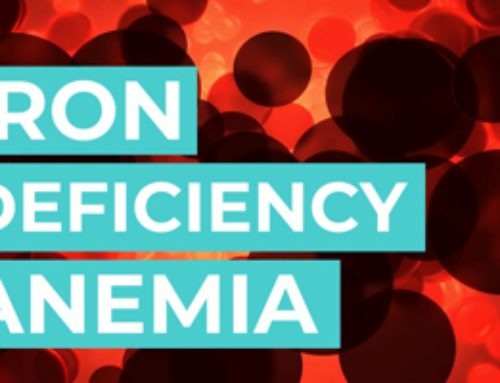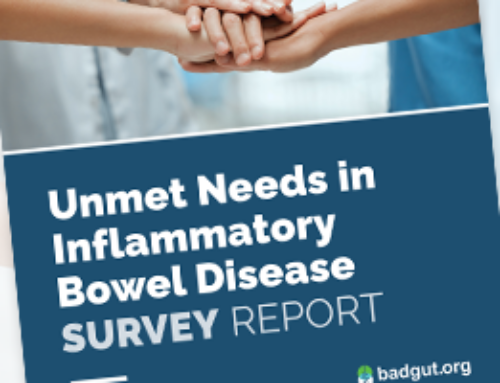
Short Bowel Syndrome Video
We have just released a new video on short bowel syndrome. Short bowel syndrome occurs when an individual doesn’t have enough small intestine to properly absorb nutrients from food. It can occur after any surgery that involves the removal if 50% or more of the small intestine. This video covers the basics about short bowel syndrome, including causes, symptoms and complications, and treatment options.
Video Transcript
The small intestine is the part of the digestive tract where most nutrients are digested and absorbed. Food that has been turned into a smoothie-like texture in the stomach mixes with more digestive enzymes in the small intestine, which help to break the food down into absorbable components. Short bowel syndrome occurs in individuals who don’t have enough functioning small intestine to absorb nutrients from food properly.
Short bowel syndrome typically arises after surgery to remove damaged intestine. Any surgery that removes more than 50% of the small intestine will likely result in short bowel syndrome, but your physician will still use other measures, including blood tests, stool tests, and physical examinations to look for other signs that you have this condition.
There are several reasons why someone might have part of their intestine removed. These include blocked or restricted blood flow in the gut, a strangulated intestinal hernia, Crohn’s disease, gastrointestinal cancer, radiation therapy, a perforated bowel, a twisting or tangling of the small intestine, injury, congenital defects, necrotizing enterocolitis, and other rare diseases.
The greatest consequences of short bowel syndrome are malnutrition and dehydration. Chronic diarrhea, fatigue, bloating, cramping, and weight loss are common symptoms. Complications and specific nutrient deficiencies can vary depending on which part of the intestine is removed. The small intestine has three distinct sections: the duodenum, which is the part that connects to the stomach, the jejunum, which is the middle section, and the ileum, which connects to the large intestine. The duodenum absorbs iron, calcium, and magnesium. The jejunum absorbs fatty acids, amino acids, monosaccharides, and water-soluble vitamins. The ileum absorbs fat-soluble vitamins, A, D, E, and K, vitamin B12, and bile acids.
Complications of short bowel syndrome include vitamin and mineral deficiencies, electrolyte imbalances, too much lactic acid in the bloodstream, fatty stools, and kidney stones. You might also produce too much stomach acid, which can enter the small intestine and interfere with nutrient absorption.
While short bowel syndrome is a complex, serious condition with complications, there are ways to help manage it. Treatment includes medications, along with nutritional modifications, and significant supplementation, but can sometimes involve surgery as well.
If you have recently had surgery to remove part of your intestine, you will not be able to eat food. You will receive your dietary needs through total parenteral nutrition, which involves delivery of nutrients directly into the bloodstream through an intravenous, or IV, tube. Some individuals might be able to start eating food within a few weeks, but for others it could take several months or even a year or more.
Once your digestive tract is at least partially functional, you will move on to having a liquid food mixture administered through a feeding tube via your nose or directly into your stomach or small intestine. This is known as enteral nutrition.
Even as you begin to reintroduce food, you will need to make ongoing adaptations to your diet and eating schedule. It is best to work with a registered dietitian to design a meal plan that will help you avoid malnutrition.
Typically, you will need to keep your meals small, but eat more often aiming for around 5-7 meals per day. Avoid large, greasy meals, as these can be more difficult to digest. It is also important to drink plenty of fluids, but do so between meals instead of with them. Base your meals around high protein foods and complex carbohydrates, and avoid eating too much fat, especially if you are missing your terminal ileum. Alcohol and caffeinated beverages can increase diarrhea, so it is best to avoid or reduce your intake of these. You might need to make more specific modifications to your diet, depending on which areas of your small intestine are affected.
Remarkably, in many individuals, the remaining intestinal villi will grow in length and thickness to make up for the loss of intestine, which increases the surface area for nutrient absorption. However, some individuals might struggle to eat normally, and could therefore need to be on enteral nutrition or TPN long-term, which can come with its own set of risks. Those who use TPN for a long time are at risk of central line infections, bone disease, and liver disease.
Most medications used to treat short bowel syndrome focus on relieving specific symptoms. These include anti-diarrheal medications, gastric acid reducers such as proton pump inhibitors, glutamine supplements, and medications that help remove bile acids from the body. One medication helps the intestines absorb nutrients and fluid by regenerating intestinal lining cells, improving intestinal absorption of fluids and nutrients, and promoting growth in the surface area of the small intestine lining.
In severe cases where medication and nutritional therapy do not work, you might need surgery, but these are uncommon. Sometimes a surgeon is able to change the shape or length of the intestine surgically, which can help improve absorption. Small bowel transplantation, in which a surgeon removes your small intestine and replaces it with the small intestine from a donor, is an option, but only in rare cases.
A diagnosis of short bowel syndrome can be very difficult, as it requires lifelong management. Treatment involves getting adequate nutrition with minimal symptoms. While there is no cure for short bowel syndrome, working closely with your healthcare team, including your physician, gastroenterologist, and dietitian, can help reduce your risk of malnutrition, dehydration, and diarrhea, while improving your quality of life.
Want to learn more?
We have several articles that you might find helpful:




















